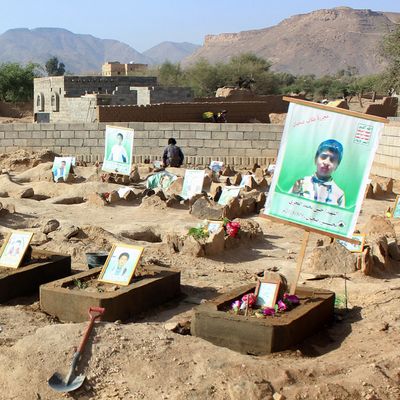
The Saudi Arabia-led war against Houthi rebels in Yemen is the “worst humanitarian crisis in the world,” according to the European Union. Nearly 17,000 civilians have been killed or injured by the coalition’s unrelenting air campaign, and millions more face the risk of starvation and the rampant spread of disease.
None of this has stopped the United States from supporting the efforts though. The U.S. continues to sell arms to Riyadh and provide refueling services to aid the air offensive. But mounting civilian casualties, and high-profile tragedies, such as the bombing of a school bus that killed dozens, have led to dissension in Washington.
Some members of Congress have publicly pushed back against U.S. support for the coalition and, The Wall Street Journal reports, so have experts within the State Department. Like the lawmakers though, State Department staffers have had no luck convincing Secretary of State Mike Pompeo to turn away from the coalition. Not necessarily because he believes the war is just, but because he wants to protect U.S. weapons sales, the WSJ reports:
Mr. Pompeo overruled concerns from most of the State Department specialists involved in the debate who were worried about the rising civilian death toll in Yemen. Those who objected included specialists in the region and in military affairs. He sided with his legislative affairs team after they argued that suspending support could undercut plans to sell more than 120,000 precision-guided missiles to Saudi Arabia and the United Arab Emirates, according to a classified State Department memo and people familiar with the debate.
According to the WSJ, Pompeo asked State Department experts earlier this month how he should deal with a congressional requirement that the U.S. either cut off refueling aid for coalition planes or certify that the coalition was taking steps to mitigate civilian casualties. The experts said Pompeo should not make such a certification as it would “provide no incentive for Saudi leadership to take our diplomatic messaging seriously.”
He did it anyway, assuring Congress that the coalition is trying to kill fewer children, but only after the State Department’s legislative team pointed out that failing to make the certification “will negatively impact pending arms transfers.” It also noted that being truthful to Congress and admitting that Saudi Arabia is not doing enough to protect the innocent would “negatively impact future foreign military sales and direct commercial sales to the region.” Pompeo seems to have found that possibility unacceptable.





























